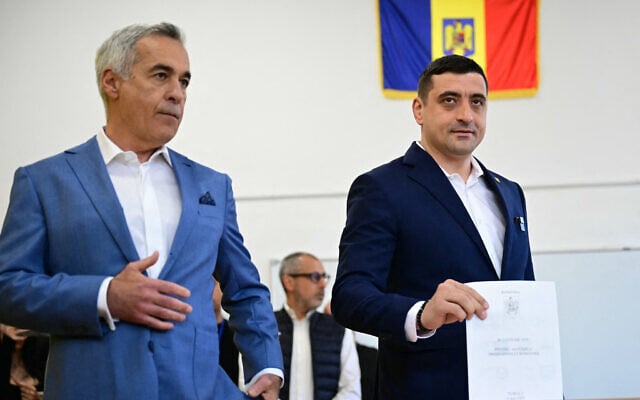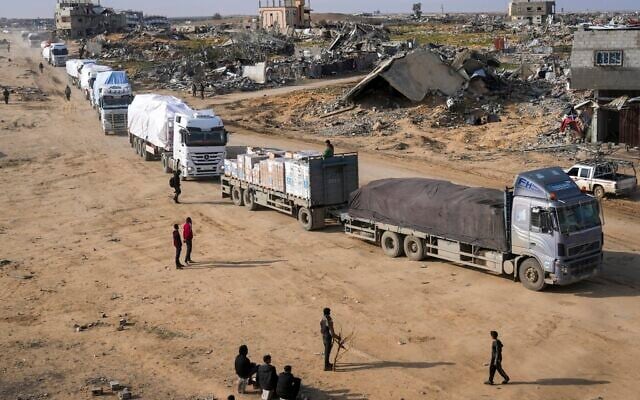



The Times of Israel is liveblogging Monday’s events as they unfold.
Far-right figure tops Romania’s presidential rerun, will face pro-EU candidate in runoff

Romania’s far-right candidate George Simion takes a comfortable lead in the first round of presidential elections, according to near-final results for the rerun of last year’s annulled ballot.
The closely watched rerun may potentially herald a foreign policy shift in the EU country of 19 million, which has become a key pillar of NATO since Russia’s invasion of Ukraine.
With 99% of ballots counted, nationalist AUR party leader Simion — a fan of US President Donald Trump — is leading with 40.5% of the vote.
He will face off in the May 18 runoff against pro-EU Bucharest mayor Nicusor Dan, who surges to second place at 20.9%, narrowly booting out governing coalition candidate Crin Antonescu at 20.3%.
“Together we made history today,” says Simion in a video message broadcast at his party’s headquarters as euphoric supporters chant “Out with the thieves, let patriots come.”
Cabinet approves plans to expand Gaza op, renew aid; neither move will be immediate

The security cabinet has unanimously approved the plan to expand the military offensive in the Gaza Strip, an Israeli official confirms to The Times of Israel.
That plan is expected to only be implemented after US President Donald Trump’s visit to the region next week, and until then, efforts will be made to reach an agreement with Hamas on a ceasefire and hostage deal, Hebrew media reports.
Additionally, the official says, the security cabinet approved a plan to renew aid deliveries into Gaza while overhauling the mechanism in order to minimize diversion of the goods by Hamas to benefit its operatives. National Security Minister Itamar Ben Gvir was the only one who voted against the plan, which is to be implemented when the situation in Gaza necessitates it.
The plan, first reported by The Times of Israel on Friday, would entail the IDF transitioning away from wholesale distribution and warehousing of aid and instead have international organizations and private security contractors hand out boxes of food to individual Gazan families.
According to Israeli and Arab officials familiar with the matter, the IDF would not be directly involved in the distribution of aid, but troops would be tasked with providing an outer layer of security for the private contractors and international organizations handing out the assistance. Israel believes this method will make it harder for Hamas to divert aid to its fighters, the officials said.
Jacob Magid and Emanuel Fabian contributed to this report.
UN humanitarian agency rejects Israeli plan to majorly alter Gaza aid delivery mechanism

The UN agency responsible for coordinating the entry of humanitarian aid into Gaza issues a formal statement rejecting an Israeli plan to overhaul the way aid enters the Strip, saying it “contravenes fundamental humanitarian principles.”
The Israeli plan, first reported by The Times of Israel on Friday, would entail the IDF transitioning away from wholesale distribution and warehousing of aid and instead have international organizations and private security contractors hand out boxes of food to individual Gazan families.
According to Israeli and Arab officials familiar with the matter, the IDF would not be directly involved in the distribution of aid, but troops would be tasked with providing an outer layer of security for the private contractors and international organizations handing out the assistance. Israel believes this method will make it harder for Hamas to divert aid to its fighters, the officials said.
Israel stopped allowing aid into Gaza on March 2 after the first phase of a ceasefire and hostage release deal concluded. Jerusalem argued that Hamas diverted much of the aid that entered during the 6-week-long truce, but that the 650 trucks per day were enough to feed the population for an extended period.
The UN agency, OCHA — whose spokesperson already dismissed the Israeli plan in comments to The Associated Press on Saturday — issues an official statement that expands on its opposition to the proposal.
“Israeli officials have sought to shut down the existing aid distribution system run by the United Nations and its humanitarian partners and have us agree to deliver supplies through Israeli hubs under conditions set by the Israeli military, once the government agrees to re-open crossings,” it says.
“The design of the plan presented to us will mean large parts of Gaza, including the less mobile and most vulnerable people, will continue to go without supplies,” it continues. “It contravenes fundamental humanitarian principles and appears designed to reinforce control over life-sustaining items as a pressure tactic – as part of a military strategy. It is dangerous, driving civilians into militarized zones to collect rations, threatening lives, including those of humanitarian workers, while further entrenching forced displacement.
“The UN Secretary-General and the Emergency Relief Coordinator have made clear that we will not participate in any scheme that does not adhere to the global humanitarian principles of humanity, impartiality, independence and neutrality. In the Occupied Palestinian Territory, the heads of all UN entities and non-governmental organizations under the Humanitarian Country Team have unanimously affirmed this position.”
Emanuel Fabian, Jacob Magid and agencies contributed to this report.
